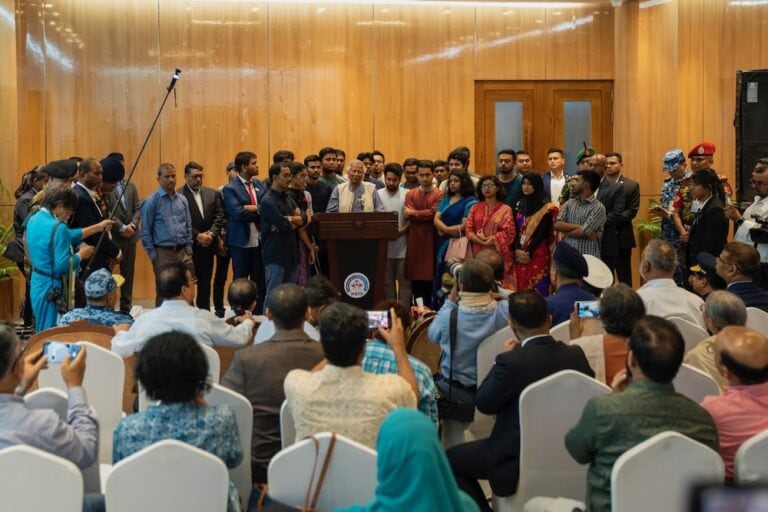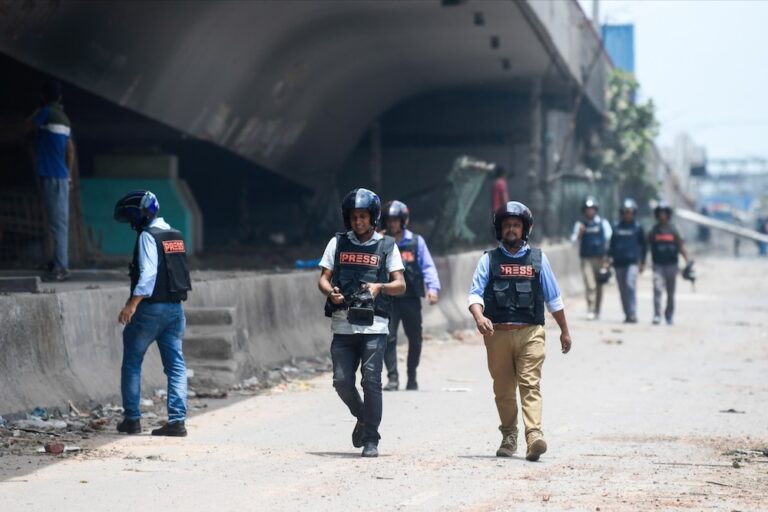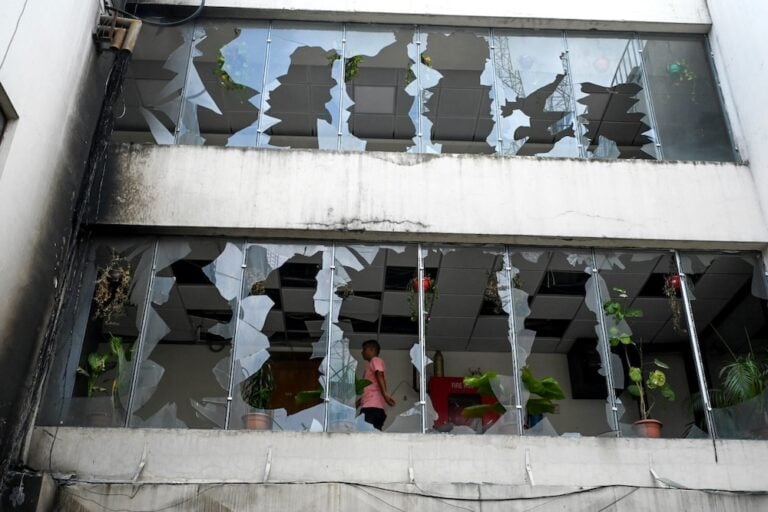Photographers and TV crews, who are more visible because of their equipment, are often exposed to violence by political party supporters.
(RSF/IFEX) – Reporters Without Borders condemns violence by political party supporters against journalists, especially photographers and TV crews, who are more visible because of their equipment. They are paying the price of increased tensions between rival parties due to upcoming local government elections.
Five journalists were injured in violence by ruling party supporters on 5 June 2011 in the town of Comilla, 100 km southest of Dhaka; two of them had to be hospitalised. Two days before that, four journalists were attacked and injured by the employees of a company that is restoring a cultural site in the western district of Kushtia.
“The supporters of the ruling Awami League have no respect for the democratic process or for journalists, whose courage we salute,” Reporters Without Borders said. “The large number of people involved in the violence in Comilla and the fact that they were armed with knives underline its gravity.
“The Awami League is directly responsible for its supporters’ attacks on press freedom and the entire democratic process, the legitimacy of which is consequently undermined. The party’s leaders must condemn this violence and call their supporters to order, while the authorities should take statements from the journalists and launch investigations in order to arrest those responsible.”
According to various sources including Abul Kashem Hridoy, the Comilla correspondent of Channel-i TV and the Bdnews24.com news agency, the 200 to 250 young thugs responsible for the violence in Comilla were members of the Bangladesh Awami Jubo League, the Awami League’s youth wing.
Pradip Dey, a cameraman with Bangladesh Television (BTV) who was hospitalised with serious injuries, told Reporters Without Borders that they rampaged through a polling centre located in a state primary school in the Comilla district of Sanichow, scaring voters and polling officers, and then attacked journalists who had arrived to cover the incident. The police made no arrests.
As well as Dey, the following journalists were injured : BTV correspondent Mizanur Rahman Chowdhury (who also heads the Comilla Press Club), Dainik Destiny correspondent Zakaria Manik, Amadher Arthoniti correspondent Imtiaz Ahmed Jitu, and Delawar Hossain Zakaria, a reporter for the INB news agency.
Dey, whose BTV camera was damaged by the assailants, was admitted to Comilla Medical College Hospital with a broken right leg, badly bruised hands and chest pains. He was threatened with reprisals if talked about the incident.
The four journalists injured in the Kushtia incident on 3 June were Prothom Alo correspondent Touhidi Hossain (Towhidi Hasan), RTV correspondent Shiekh Hossain Belal, Ekushey Television correspondent Zahurul Islam and Ekushey Television cameraman Ahmed Sajeeb.
Hossain’s injuries were the most serious. He was admitted to Kushtia General Hospital with multiple fractures but doctors said his life was not in danger. The others were discharged from hospital after receiving first aid treatment.
The incident took place at a heritage site in Shilaidaha, a village in the Kumarkhali subdistrict, where residents had complained to the contractor, leading Awami League member Ali Hossain, about the poor quality and slow progress of the renovation work. After the contractor reacted by threatening them, they referred the matter to the Kushtia press club.
A group of journalists went to the site on the morning of 3 June. While they were recording interviews with site engineers from the archaeology department and the site’s custodian, shooting video and still photos, they were suddenly attacked by thugs armed with clubs, steel bars and hockey sticks. Touhidi Hossain sought refuge in the custodian’s office but the thugs broke down the door, dragged him out and beat him with their steel bars batons. Officials finally rescued him, drove him to a police station and then to the hospital.
Police went to the site, rescued the three other besieged journalists and took them to the hospital for treatment. Two of the assailants have since been arrested and the police are looking for their suspected leader and his accomplices.
Bangladesh is ranked 126th out of 178 countries in the 2010 Reporters Without Borders press freedom index.


